跨文化交际第七章
- 格式:pptx
- 大小:178.56 KB
- 文档页数:6
![跨文化交际(UNIT 7)[优质ppt]](https://uimg.taocdn.com/45189eb60912a21615792900.webp)
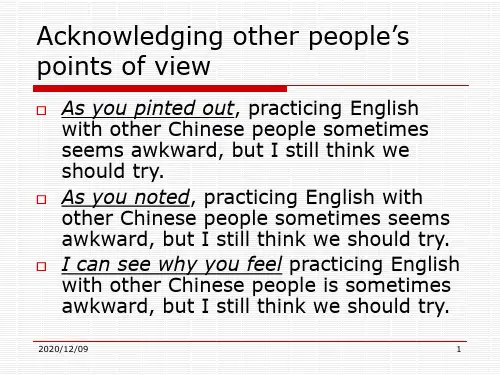

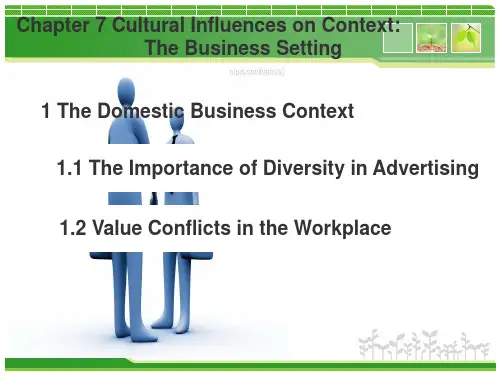
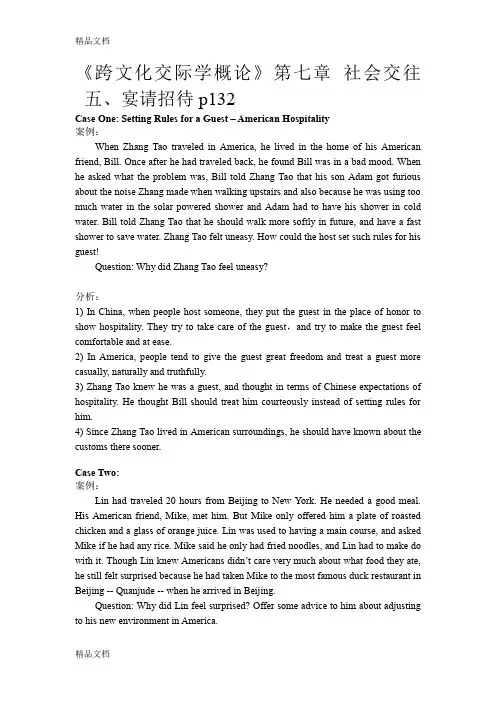
《跨文化交际学概论》第七章社会交往五、宴请招待p132Case One: Setting Rules for a Guest – American Hospitality案例:When Zhang Tao traveled in America, he lived in the home of his American friend, Bill. Once after he had traveled back, he found Bill was in a bad mood. When he asked what the problem was, Bill told Zhang Tao that his son Adam got furious about the noise Zhang made when walking upstairs and also because he was using too much water in the solar powered shower and Adam had to have his shower in cold water. Bill told Zhang Tao that he should walk more softly in future, and have a fast shower to save water. Zhang Tao felt uneasy. How could the host set such rules for his guest!Question: Why did Zhang Tao feel uneasy?分析:1) In China, when people host someone, they put the guest in the place of honor to show hospitality. They try to take care of the guest,and try to make the guest feel comfortable and at ease.2) In America, people tend to give the guest great freedom and treat a guest more casually, naturally and truthfully.3) Zhang Tao knew he was a guest, and thought in terms of Chinese expectations of hospitality. He thought Bill should treat him courteously instead of setting rules for him.4) Since Zhang Tao lived in American surroundings, he should have known about the customs there sooner.Case Two:案例:Lin had traveled 20 hours from Beijing to New York. He needed a good meal. His American friend, Mike, met him. But Mike only offered him a plate of roasted chicken and a glass of orange juice. Lin was used to having a main course, and asked Mike if he had any rice. Mike said he only had fried noodles, and Lin had to make do with it. Though Lin knew Americans didn’t care very much about what food they ate, he still felt surprised because he had taken Mike to the most famous duck restaurant in Beijing -- Quanjude -- when he arrived in Beijing.Question: Why did Lin feel surprised? Offer some advice to him about adjusting to his new environment in America.分析:1) 0n the topic of hospitality, the Chinese stress on warmth and demonstrating friendship. They take the guest to a famous or luxurious restaurant to have a very good (expensive) meal to show their hospitality. And the Chinese are used to having a big meal. The more dishes they put out,the greater the warmth and friendship they show.2) In western countries, people stress on freedom. They give the guest great freedom to choose their own foods. And westerners tend to have only one main course and some juice or dessert,which is viewed as casual in the eyes of the Chinese.3) Lin lived in American surroundings and should have adjusted himself quickly to the new world (lifestyle). He should have known the custom there first, and felt more at ease in Mike’s home.Case Three: Equality or Hospitality for Table Manners案例:Lin Hua has accompanied an American delegation to visit China. They have experienced the hospitality of the Chinese people. After returning to America, Linhua once visited them. They were so glad to meet again. Linhua offered to host the meal, but they refused. They ordered their own dish, and Linhua ordered her own. When footing the bill, they only paid their part,and no one wanted to pay for Linhua. Linhua found them so inhospitable, though she knew the Americans would usually pay for their own food.Question: Why did Linhua find them inhospitable?分析:1) In China, to show hospitality, people tend to host the meal. And if they cannot do this, they at least will struggle to pay for the guest.2) In America, people tend to pay for themselves to show equality and independence.3) Linhua knows this custom, but from a Chinese point of view, she still finds this hard to accept, and feels it a little inhospitable.Case Four:案例:I have an American friend. I have invited him several times, and at long last he invited me to his home one day. He told me to get there at 3 p m. I thought we could chat and have a meal together. I gave him a Chinese calendar, a woman’s scarf and a bottle of Chinese white wine. He only took out a dish of nuts, a plate of bread and a bottle of wine. After two hours’ chat, I found there was no hint of a meal and said good-bye to him. He only gave me a box of chocolate as a present for the New Year. After I got home, I found the box already been opened. I was very surprised, Question: What surprised me?分析:1) In China, a visit to home always includes a meal. And the guest always bringsa relatively expensive present to the host. And the present should be well wrapped or untouched.2) In the west, a visit to home only means a meeting, not necessarily including a meal. And the present is treated not as importantly as it is in China.3) I acted in a way that was based on Chinese customs, so I felt the American way was very interesting (unusual).Case Five: Way of Entertaining Guests in China ---- Drink more and more案例:Tom, an American, went to a Chinese home for the first time. He was offered some tea. Just when the first cup was about to finish, more tea was added. He drank the second cup. Then the cup was filled the third time. Then he drank it, then ⋯ until he was quite full. Tom was totally confused by the way of entertaining.Question: Why was Tom totally confused?分析:1) Traditional Chinese custom requires that during the course of entertaining, the host has to always pour more wine or tea to the guest’s glass or cup, and always adds more food to the guest’s plate or bowl without asking whether it’s wanted.2) Chinese guests know how to respond to this type of hospitality. They simply leave the wine, tea, or food in the container and stop having any more. But Tom, the American guest in the case didn’t know this.3) He followed the politeness rule of his culture: it’s not good manners to leave food in one’s own plate at a dinner table. Therefore, without any knowledge of the differences between the two cultures, an American guest would very likely suffer from either drinking or eating too much in such a situation.Case SixAs a foreign student at the University of Wisconsin in Madison, Keiko Ihara (Japanese) was on a strict budget. She had all her tuition and books paid for by scholarships and grants and until recently was comfortably housed in the dormitory. Wanting to live in the community rather than in the dormitory, she found a small apartment to share with a friend. Her college friends, knowing of her situation, offeredto round up some of the necessary items for apartment living. Keiko politely declined, saying she could manage. Wanting to help out her friends found some old but still usable household appliances and furniture. Mary had an old desk that was in her garage. Ed had some chairs from his uncle, and Joe and Marion had a few extra dishes. They cheerfully brought them over one day. Keiko seemed very embarrassed, but gracefully accepted them, sincerely and profusely thanked them.The following week they were each presented with a gift from Keiko. Mary got an ornate jewelry box, Ed a volume of woodcuts by a famous Japanese artist, and Joe and Marion a beautiful Japanese vase, all of which were of considerable worth and value, much more than the old things they had donated to her. They all protested that she could not afford to give such elaborate gifts; they really expected nothing as the household items were not really being used and they would rather have her use them. Keiko, however, insisted that they take the gifts. In the end, they accepted the gifts, although they all felt uncomfortable as they knew she was really sacrificing to give them.Questions:1. What do you think of Keiko insisting on giving valuable gifts to her college friends?2. Why did Keiko’s friends feel very uncomfortable when they received valuablegifts in return?分析:Keiko insists on giving valuable gifts to her college friends, because in countries like Japan, exchanging gifts is a strongly rooted social tradition. Should you receive a gift, and don’t have one to offer in return, you will probably create a crisis. If not as serious as a crisis, one who doesn’t offer a gift in return may be considered rude or impolite. Therefore, in Japan, gifts are a symbolic way to show appreciation, respect, gratitude and further relationship.Keiko obviously has taken those used items from Mary, Ed and Marion as gifts, for she probably doesn’t know that Americans frequently donate their used household items to church or to the community. Mary, Ed and Marion would never consider those used household items given to Keiko as gifts. No wonder they felt very uncomfortable when they received valuable gifts in return.Case SevenSelma, who is from the US, is in a student exchange program in Indonesia. One day, she was asked to attend a birthday party and she was delighted, for she was curious to know what an Indonesian birthday party was like. To her surprise, she was the only one that dressed in typically Western clothes. Although she had no strong reason to become uneasy, her uneasy feeling prevailed as the party was going on. To make herself feel better, she went to the food table and began to help herself. But, upon leaving the table, she tripped on the leg of a chair and spilled her drink on the floor. One of the girls stooped down to mop up the spill and everyone else laughed out loud. Selma, uncertain what to do next, quietly moved out of her way with her head lowered in shame.Questions:3. What functions does laughing serve in similar situations in China?4. What should we do to help ourselves or other people out of embarrassmentcaused by cultural differences in laughing?分析:Just like smile, laughing does not always serve the same function in different cultures. Interestingly, for us Chinese, laughing often has a special function on some tense social occasions. People may laugh to release the tension or embarrassment, to express their concern about you, their intention to put you at ease or to help you come out of the embarrassment. In this case, the people there were actually wishing to laugh with the American rather than laugh at her. Their laughing seemed to convey a number of messages: don‘t take it so seriously; laugh it off, it‘s nothing; such things can happen to any of us, etc. Unfortunately the American was unaware of this. She thought they were laughing at her, which made her feel more badly and angry, for in her culture laughing on such an occasion would be interpreted as an insulting response, humiliating and negative.。
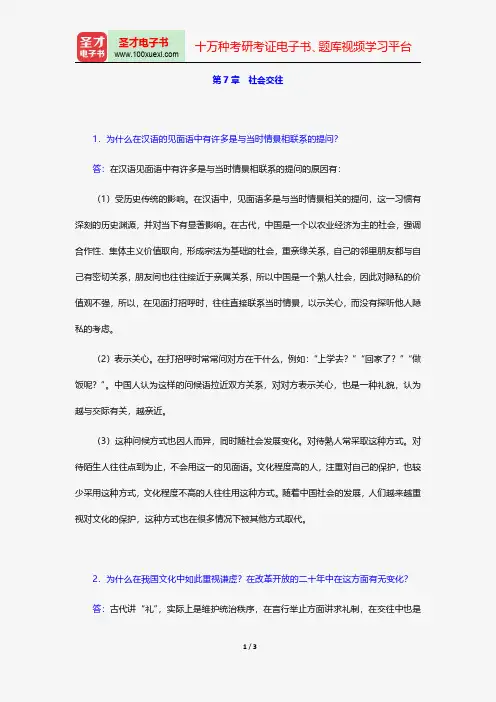
第7章社会交往1.为什么在汉语的见面语中有许多是与当时情景相联系的提问?答:在汉语见面语中有许多是与当时情景相联系的提问的原因有:(1)受历史传统的影响。
在汉语中,见面语多是与当时情景相关的提问,这一习惯有深刻的历史渊源,并对当下有显著影响。
在古代,中国是一个以农业经济为主的社会,强调合作性、集体主义价值取向,形成宗法为基础的社会,重亲缘关系,自己的邻里朋友都与自己有密切关系,朋友间也往往接近于亲属关系,所以中国是一个熟人社会,因此对隐私的价值观不强,所以,在见面打招呼时,往往直接联系当时情景,以示关心,而没有探听他人隐私的考虑。
(2)表示关心。
在打招呼时常常问对方在干什么,例如:“上学去?”“回家了?”“做饭呢?”。
中国人认为这样的问候语拉近双方关系,对对方表示关心,也是一种礼貌,认为越与交际有关,越亲近。
(3)这种问候方式也因人而异,同时随社会发展变化。
对待熟人常采取这种方式。
对待陌生人往往点到为止,不会用这一的见面语。
文化程度高的人,注重对自己的保护,也较少采用这种方式,文化程度不高的人往往用这种方式。
随着中国社会的发展,人们越来越重视对文化的保护,这种方式也在很多情况下被其他方式取代。
2.为什么在我国文化中如此重视谦虚?在改革开放的二十年中在这方面有无变化?答:古代讲“礼”,实际上是维护统治秩序,在言行举止方面讲求礼制,在交往中也是将自己置身于等级差别中。
礼的核心是天地人伦的上尊下卑。
这与较强的群体观念有关,之所以谦虚,是为了不显露自己,为了和大家搞好关系。
改革开放后发生了一些变化,主要因素是:经济地位;女子地位;国际影响。
3.为什么我国在许多地方有送重礼的习俗?近年来有无变化?答:“礼尚往来”是我国文化习俗中的一个重要方面。
在送礼时十分重视礼物的价值,一般说来,礼品越贵重,就越说明对于对方的尊重。
对方的社会地位越高,礼品就越要贵重,否则“拿不出手”。
中国人之所以看重送礼是因为人们希望通过送礼加深与亲戚朋友的关系,扩大自己的关系网。



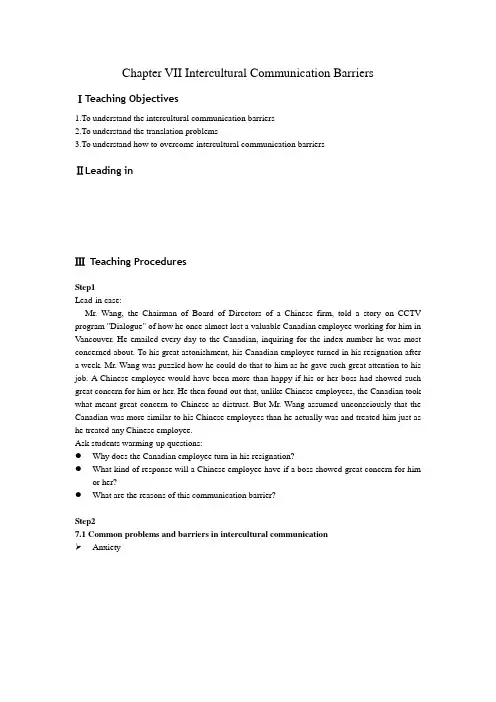
Chapter VII Intercultural Communication BarriersⅠTeaching Objectives1.To understand the intercultural communication barriers2.To understand the translation problems3.To understand how to overcome intercultural communication barriersⅡLeading inⅢTeaching ProceduresStep1Lead-in case:Mr. Wang, the Chairman of Board of Directors of a Chinese firm, told a story on CCTV program "Dialogue" of how he once almost lost a valuable Canadian employee working for him in Vancouver. He emailed every day to the Canadian, inquiring for the index number he was most concerned about. To his great astonishment, his Canadian employee turned in his resignation after a week. Mr. Wang was puzzled how he could do that to him as he gave such great attention to his job. A Chinese employee would have been more than happy if his or her boss had showed such great concern for him or her. He then found out that, unlike Chinese employees, the Canadian took what meant great concern to Chinese as distrust. But Mr. Wang assumed unconsciously that the Canadian was more similar to his Chinese employees than he actually was and treated him just as he treated any Chinese employee.Ask students warming-up questions:●Why does the Canadian employee turn in his resignation?●What kind of response will a Chinese employee have if a boss showed great concern for himor her?●What are the reasons of this communication barrier?Step27.1 Common problems and barriers in intercultural communicationAnxietyPresent the film The Year of the Yao, which shows Yao’s anxiety about new environment, language and cooperation with the team.Anxiety occurs because of not knowing what one is expected to do, and focusing on that feeling and not be totally present in the communication transaction.Case Analysis: Unnecessary Anxiety or Not?Sugawara (1993) surveyed 168 Japanese employees of Japanese companies working in the United States and 135 of their U.S coworkers. Only 8% of the U.S. coworkers felt impatient with the Japanese coworkers’ English. While 19% of the Japanese employees felt their spoken English was poor or very poor and 20% reported feeling nervous when speaking English with U.S. coworkers, 30% of the Japanese employees felt that the U.S. coworkers were impatient with their accent, and almost 60% believed that language was the problem in communicating with the U.S. coworkers. For some Japanese workers, anxiety over speaking English properly contributed to avoiding interactions with the U.S. coworkers and limiting interactions both on and off the job to other Japanese only.Assuming similarity instead of differenceA case about the experience of a Danish woman (in the textbook: P96)Present a film to the students: The Guasha TreatmentBeijingers in New York (TV seriers which shows that Wang Qiming assumes their friends will take good care of his wife and himself and offer good accommodation when they first come to New York, but on the contrary the friend went away after welcoming them at the airport and left themalone in a totally strange street.)EthnocentrismLet students see part of the film The King and I (or the new version Anna and the King) in which the King, prince and the concubines of Siam think their country is superior than other countries even the very strongest country England in the seventeenth century.Ethnocentrism means, by the definition of the Webster’s Third New International Dictionary: (1) a habitual disposition to judge foreign peoples or groups by the standards and practices of one’s own culture(2) a tendency toward viewing alien cultures with disfavor and a resulting sense of inherent superiorityCase Analysis: You Are Well BlessedOr Role-Play: we can let three students role-play in the class: one Chinese host, an American lady, and an interpreterYang GuifeiVarious forms of ethnocentric attitude:My culture should be the role model for other cultures.I have little respect for the values and customs of other cultures.Most people would be happier if they lived like people in my culture.People in my culture have just about the best lifestyles of anywhere.I do not cooperate with people who are different.I do not trust people who are different.I dislike interacting with people from different cultures.Stereotypes and prejudicea.StereotypesStereotypes are the perceptions or beliefs we hold about groups or individuals based on previously formed opinions and attitudes.PARISIN THETHE SPRINGThe conservative and gentlemen-like EnglishThe demonstrative and talkative ItaliansThe music-loving, masculine LatinosCulture ImageEnglish conservative, reserved, polite, proper, formal French arrogant (傲慢的, 自大的), rude, chauvinistic (沙文主义的), romantics,gourmets (能精选品评美食、美酒的人), cultural, artisticItalians demonstrative, talkative, emotional, romantics, bold, artistic Latin Americans manana attitude, macho (男子气的), music lovers, touchersCase Analysis: StereotypingCase Analysis: A Tragedy in U.S Historyb. PrejudiceShow the following pictures to the students and let them discuss the communication barriers involved.Stereotyped Chinese northernersPrejudice refers to the irrational dislike, suspicion, or hatred of a particular group, race, religion, or sexual orientation.Case Analysis: An Interesting ExperimentShow the film Pride and Prejudice which shows the prejudice Elizabeth holds toward Darcyc.RacismRacism is any policy, practice, belief, or attitude that attributes characteristics or status to individuals based on their race.d.The role of communicationWhat are the reasons for the persistence of prejudice, ethnocentrism, stereotypes and racism? SocializationSocial benefitsEconomic benefitsPsychological benefitsHate SpeechHate speech refers to hostile words or actions that people say or do against a certain group because that group is different.7.1.5 Language problemsa. Sapir-Whorf hypothesisLinguistic determinist is that language structure controls thought and cultural norms.Linguistic relativity is more scientific. It holds that culture is controlled by and controls language.b. Translation problemsAxtell (1991) identifies a number of U.S. translation problems:1) General Motors automobile "Nova" in Spanish means "doesn't go";2) Pepsi-Cola's "Come Alive with Pepsi" when translated in Taiwanese is "Pepsi brings your ancestors back from the grave";3) Electrolux, a Swedish manufacturer, used "Nothing sucks like an Elecrolux," which failed because of the slang meaning of suck in the United States;4) Bich pens were originally named Bich by their French manufacturer.What led to translation problems?The lack ofa.V ocabulary equivalencemokusatsu:b. Idiomatic equivalenceThe old man kicked the bucket.???c. Grammatical-syntactical equivalenceAsk students the different meanings of “book a place” and “place a book” by changing the verb and noun of the phased. Experiential equivalenceTell students the meanings of department store, shopping mall, and plaza.e. Conceptual equivalence.Corruption in Singapore is an anti-law behavior while in Thailand it is only morally wrong which led to the corruption of the whole society, from the president to the common taxi-driver.7.2 Overcoming Intercultural Communication Barriers7.2.1 Raise awarenessa.Self-awarenessb.Consciousness of one’s values and biases and their effectc.Necessity of becoming comfortable with differencesd.Sensitivity to circumstances7.2.2 Obtain knowledgeWe can obtain knowledge by reading books, surfing on the internet and communicating with people from different cultures.7.2.3 Enhance motivation7.2.4 Master skillsCultural-general skillsCultural-specific skillsStep3Raising Intercultural Awareness:文化定势:通过描述对不同群体或个人的印象,了解文化定势现象,学习文化定势产生的原因、优点和缺点。

《跨文化交际学》第7章跨文化交际学第7章(第1节)是关于跨文化沟通的重要概念和理论的介绍。
本章主要讨论了跨文化交际的定义、特点以及对跨文化交际的理解和引导的重要性。
以下是对本章内容的较为详细的总结。
跨文化交际即在不同文化背景下进行的交际活动。
在全球化的今天,跨文化交际已经成为人们日常生活中不可避免的一部分。
了解和应用跨文化交际学的理论和方法,对于促进文化间的相互理解和沟通有着重要的意义。
首先,本节明确了跨文化交际的特点。
跨文化交际存在着文化差异、语言障碍、非语言行为等问题,这些问题会影响到交际双方的理解和沟通效果。
而且,跨文化交际是一个动态的过程,受到社会、历史和政治等因素的影响。
其次,本节介绍了跨文化交际学的定义和研究内容。
跨文化交际学是研究人类不同文化间交际行为和交际现象的学科。
它关注文化差异对交际的影响,以及如何理解和适应跨文化环境中的交际情境。
跨文化交际学的研究内容包括文化差异的认知、非语言交际、语言和语境的关系等。
接着,本节介绍了跨文化交际学的重要性。
了解跨文化交际学的理论和方法可以帮助人们更好地理解并处理跨文化交际中的问题。
通过学习跨文化交际,人们可以提高自身的文化意识和文化敏感性,增进与他人的交流理解,促进世界各地不同文化的和谐与发展。
最后,本节介绍了跨文化交际学的研究方法。
跨文化交际学采用综合性和跨学科的研究方法,如实地调查、实验、对比分析等。
研究者通常需要了解不同文化间的差异和相似之处,并根据具体交际情境进行有效的分析和解释。
综上所述,跨文化交际学是一个重要的学科,它能够帮助人们更好地理解和应对跨文化交际中的问题。
通过学习跨文化交际学的理论和方法,人们可以提高自身的文化意识和认知水平,增进与他人的交流理解,促进文化之间的和谐与发展。
因此,掌握跨文化交际学的知识对于现代人们来说具有重要的意义。
《跨文化交际学概论》第七章社会交往五、宴请招待p132Case One:Setting Rules for a Guest – American Hospitality案例:When Zhang Tao traveled in America,he lived in the home of his American friend, Bill。
Once after he had traveled back,he found Bill was in a bad mood. When he asked what the problem was,Bill told Zhang Tao that his son Adam got furious about the noise Zhang made when walking upstairs and also because he was using too much water in the solar powered shower and Adam had to have his shower in cold water. Bill told Zhang Tao that he should walk more softly in future,and have a fast shower to save water。
Zhang Tao felt uneasy. How could the host set such rules for his guest!Question:Why did Zhang Tao feel uneasy?分析:1)In China, when people host someone,they put the guest in the place of honor to show hospitality. They try to take care of the guest,and try to make the guest feel comfortable and at ease.2)In America,people tend to give the guest great freedom and treat a guest more casually,naturally and truthfully。